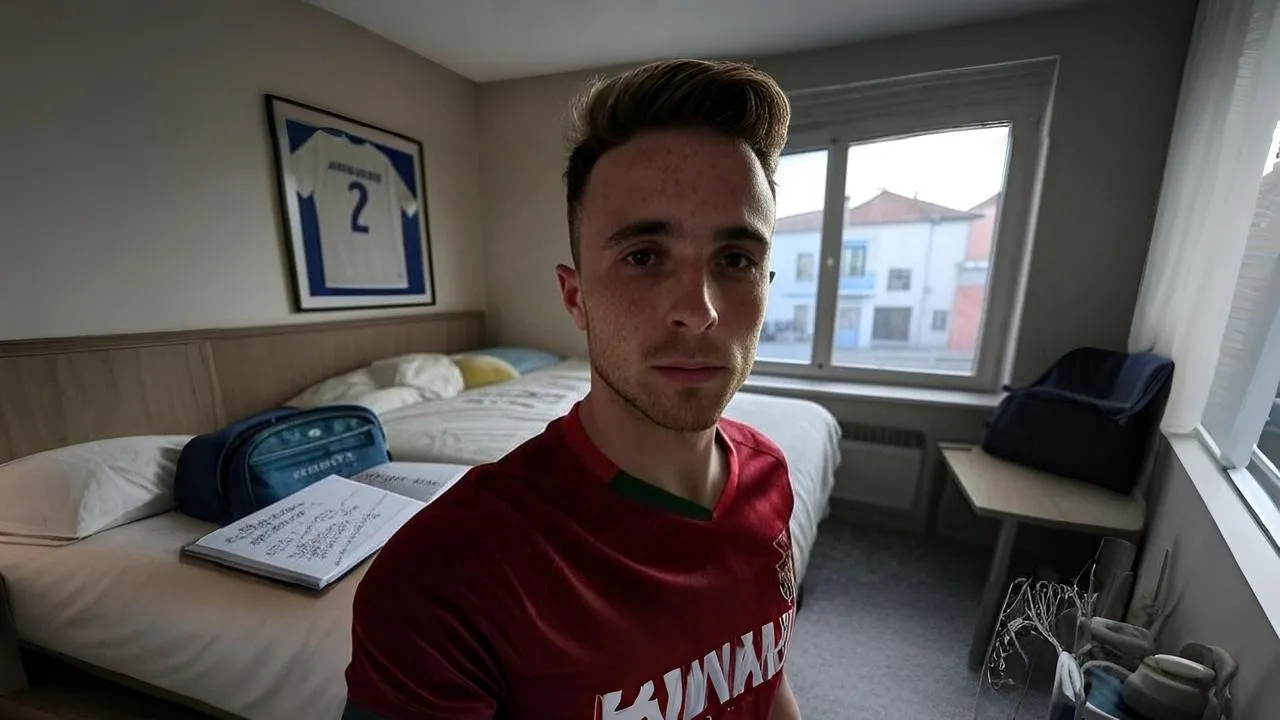Diogo Jota’s story wasn’t one of glory – it was one of grit
Some players rise through trophies. Diogo Jota rose through quiet defiance and perseverance. He died aged 28 alongside his brother André, leaving behind not just goals, but a legacy of quiet strength and unwavering belief.
4 minutes

AI-generated image. Editorial use only.

Some footballers grow not through success, but through stubbornness. Diogo Jota’s name won’t be remembered for the trophies he lifted, but for the fight he carried in silence. At 28, he tragically lost his life in a car accident alongside his brother André. What he left behind wasn’t just goals—it was a life to be remembered. He never sought the spotlight. Every match, every step, was a way of saying: “I belong here.”
From cast aside to cult hero
Jota, now etched into Liverpool memory for his goals, was repeatedly turned away in his youth. He trialled with Porto and Benfica—two of Portugal’s giants—only to be told he wasn’t good enough. Yet even as a child, he was relentless and disciplined. No one gave him a chance.
“In my youth I never played for any big club. I went on trials at Porto and Benfica, but I never stayed,”
he told Sky Sports. That’s where his real journey began—at Gondomar, a modest local side where his family had to pay for him to play. A boy funding his own football journey, climbing all the way to the elite of Europe.

More than talent: respect earned through character
While teammates moved on to bigger clubs, Jota remained overlooked. But his performances grew into a silent rebellion. He featured in two age groups over the same weekend, scoring hat-tricks and haunting goalkeepers.
“When my body started developing, I felt I could do much more on the pitch,”
he told FourFourTwo. After scoring 39 goals in a single season, it was Paços Ferreira—a small club with a big heart—that gave him his break. For someone like Jota, that was all he needed.
Leader on the pitch, big brother off it
Even after breaking into the first team, he chose to live with other academy players in the club president’s home. He divided chores, organised dinners, and looked out for them. Even then, he carried a maturity that would later earn him the “mentality monster” nickname at Liverpool. He didn’t just play football—he supported people.
A heart scare met with calm resolve
During his move to Paços, medical checks revealed a heart irregularity. It’s the kind of news that could derail a young career. But Jota stayed calm. He waited through weeks of tests. Eventually, he was cleared to play. He was never the one to panic—he waited for his moment.
“His mental strength is incredible. He was always calm, always focused,”
said youth director Gilberto Andrade to The Telegraph. His patience, both physically and mentally, was something to be admired.
Atlético setback, Porto redemption
At 19, Jota signed for Atlético Madrid. Many saw it as his breakthrough. But he never played a single competitive game for them. Instead, he was loaned to Porto and Wolves over two years. To some, it looked like failure. But for Jota, it was all part of the process. “Even just training there taught me a lot,” he later said. He didn’t crumble under the weight of disappointment. He made his mark. A hat-trick on debut for Porto. Goals in his first four home matches for Wolves.
From outsider to indispensable
When Jota joined Liverpool, many assumed he’d be overshadowed by Salah, Mané and Firmino. But he scored on his debut and earned his place. Klopp didn’t call him a “pressing monster” for nothing. He wasn’t just a runner—he embraced responsibility.
“Every experience, every setback makes you stronger. Things might look good now, but it was tough before. No matter what, you keep working towards your goal,”
he told The Athletic. At a fan signing session, he said simply,
“I’m one of you now.”
Those few words instantly made him one of their own.
Jürgen Klopp and assistant Pep Lijnders had their own ways of describing him. Klopp called him a “mentality monster,” Lijnders a “pressing machine.” They weren’t just talking tactics—they were describing who he was.
It’s not what he won, it’s what he gave
Jota won more admiration than medals. He never sought the spotlight—but he was never ignored. When he pulled on the Liverpool shirt, he became more than a player. He became a symbol—of quiet strength and steady resolve.
Two brothers, one legacy
Life never gave him much—but it took him early. His brother André was cut from the same cloth: humble, quiet, relentless. Now, both are gone. But what’s left isn’t numbers or goals. What remains is proof that belief and dignity can be lived without ever being spoken.
Diogo Jota may have only lived 28 years, but he showed millions what perseverance looks like. He’s gone—but his name will live in the heart of every young fighter chasing a dream.
May he rest in peace.
Share your thoughts, join the conversation!

Clear message from Inter Miami about Messi’s future: both parties want to continue

Rodri injury shakes City: Al Hilal defeat dents morale ahead of Premier League start

European puzzle deepens at Crystal Palace: UEFA uncertainty continues as Woody Johnson investment awaits Premier League approval

Jonny Evans appointed as head of academy player development at Manchester United

Barcelona’s attacking plan takes shape: Nico Williams set for the left wing, Olmo preparing for false nine role

Real Madrid push for Vinícius Júnior renewal despite 2027 deal; Courtois and Brahim follow


